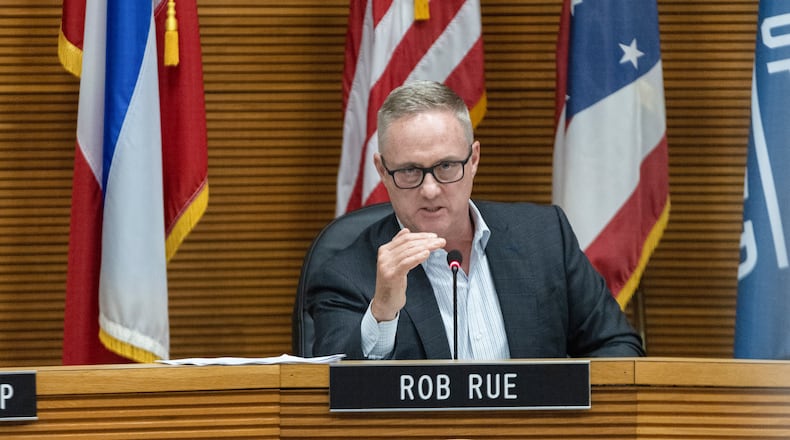“We understand that recent statements by President-elect Trump include the possibility of increased enforcement actions including potential deportations which may impact communities across the country, including ours,” Rue continued.
“Today Haiti and its citizens remain a country that is eligible for Temporary Protected Status. We will continue to monitor and await further guidance on this matter as the federal administration transitions. We continue to ensure that our actions align with federal directives and will prioritize the well-being and security of all our residents.
Rue concluded, “As developments arise, we are committed to keeping our community informed and in being transparent about our role in supporting these efforts.”
When public comments from city residents began at Tuesday’s meeting, many of the speakers were among those who have regularly addressed the commission with allegations against the Haitian population over the past year. Some of these speakers claimed credit for helping to drive the dissent that resulted in the re-election of the former President.
There were other speakers who expressed support for Haitian residents and their contributions to the Springfield community.
Moreno addresses TPS
U.S. Senator-elect Bernie Moreno said Thursday night that Haitians living legally in Springfield will be allowed to stay until their temporary protected status ends on Feb. 3, 2026.
“They’re under temporary protected status. That status is good until February of ‘26,” Moreno said at Ohio Republican Party headquarters in Columbus, according to cleveland.com. “That’s the law. We’re going to respect that. We’re not going to change that.”
That newer comment from Moreno differs from older claims from Donald Trump on the campaign trail this fall, when he said, “We’re going to have the largest deportation in the history of our country, and we’re going to start with Springfield and Aurora (Colorado).”
It also differs in tone from comments made this week by Tom Homan, who Trump said he will appoint as “border czar.”
Homan told conservative Cleveland-based talk show host Tom Frantz that Temporary Protected Status is at the approval of the secretary of homeland security. “That can end tomorrow,” Homan said. “And if TPS ends, they are removable.”
In other interviews, Homan said he planned to “take the handcuffs off ICE” and ramp up arrests by immigration and customs enforcement officials. Some of those comments focused on immigrants who don’t have any legal status.
Miguel Jerome, one of several leaders of Springfield’s Haitian community, told this news outlet, “as we are getting closer to January … probably a good majority of the people in town are talking (about) ‘is it safe to stay in town?’ "
No one can put an exact figure on the number of Haitians living in Springfield, but city and Clark County officials, pulling from multiple data sources, have estimated the number at 10,000 to 15,000.
Those Haitian immigrants also have a variety of immigration statuses — some with Temporary Protected Status, some still at the less-protected level of humanitarian parole, still others with asylum cases. Any protection from deportation can vary depending on that status.
Credit: Bill Lackey
Credit: Bill Lackey
Some of the Haitians are very new arrivals, but others have been here for as long as five years and work at a variety of local companies.
Ohio Gov. Mike DeWine warned in late October that if the Haitian population is removed from Springfield (or leaves on its own) the city’s business community would suffer.
“The reality is that some of the economic progress that we have made at Springfield will go away,” DeWine said.
Moreno said Thursday that the companies that employ the Haitians should have been making plans for their departure all along, cleveland.com reported, as Moreno said they should know the temporary protected status would expire at some point.
City addresses emergency powers
Speakers at Springfield city commission also raised questions about the emergency powers employed by the city during the timeframe when the city became the focus of national attention and the target of bomb threats that continue to be investigated by the Federal Bureau of Investigation.
City officials say the FBI has shared no specifics with them regarding the site of origin of those threats, but say it has been confirmed as part of a swatting scheme originating from overseas.
The threats prompted the state of Ohio to dedicate additional security to the city schools and drew support from other nearby communities who loaned officers to assist in addressing security concerns in city government buildings and at local non-profits and businesses.
The provision for mayoral emergency powers was originally implemented in 2019 during the pandemic, officials said, and was reimplemented during the unprecedented experience of bomb and death threats directed at the city and city officials in September.
“The Mayoral Emergency Proclamation gives state of emergency powers for security-related items only as related to threats,” Rue said. “It helps us move efficiently to protect the city.”
City Manager Bryan Heck indicated that officials expect to rescind the Mayoral Emergency Proclamation at the next city commission meeting on Dec. 3.



